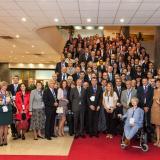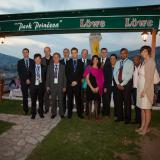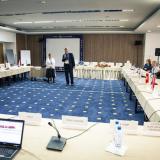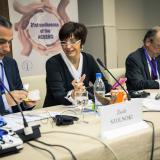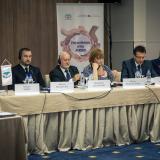21st ACEEEO Annual Conference and General Assembly meeting
Sarajevo, Bosnia and Herzegovina
"Participation of national minorities in the election process"
"Participation of persons with disabilities in the election process"
13 – 15 September, 2012
13 September, 2012 – Thursday
Special Event: BRIDGE Session on "Access to the Electoral Processes"
Participants in this interactive workshop had the possibility to put oneself into the place of people with various disabilities. There was a suggestive discussion on the barriers that people belonging to vulnerable groups (such as people with disabilities, people belonging to minorities, illiterate people, refugees etc.) have to face if they would like to exercise their right to vote or participate in the electoral process as a candidate, observer or member of an EMB, and participants tried to think over possible solutions. Finally, a heated debate developed on the questions of suffrage of children and people with intellectual disabilities.
14 September, 2012 – Friday
Plenary Session: Participation of persons with disabilities in the election process I.
Chair: Mr. Richard Soudriette, President, Center for Diplomacy and Democracy
Speakers:
Ms. Virginia Atkinson, Inclusion Program Officer, IFES
The UN Convention on the Rights of Persons with Disabilities (CRPD) entered into force in 2008. 153 countries have signed it, 111 have also ratified. According to Article 29, States Parties shall guarantee to persons with disabilities political rights and the opportunity to enjoy them on an equal basis with others. The commitment includes among others ensuring that voting procedures, facilities and materials are appropriate, accessible and easy to understand and use, voting by secret ballot, standing for elections and working as an EMB official, poll worker or observer. There are several precedents pointing forward in the implementation (e. g. in Guatemala).
To read Ms. Atkison's presentation, please click here.
Mr. Rodolfo Cattani, Secretary General, European Disability Forum (EDF), representing International Disability Allience (IDA)
According to the Disability World Report, published in 2011, persons with disabilities represent 15% of the world's population. Concerning the laws, policies and practicies on the right to political participation by persons with disabilities states differ from the ones where right to vote is guaranteed for persons with disabilities de iure and de facto to states where all persons with intellectual disabilities or under guardianship are prohibited to exercise voting rights. In the UN system the right to vote and to be elected of persons with disabilities are provided by three international instruments: Universal Declaration of Human Rights, CRPD and International Covenant on Civil and Political Rights. In addition, the human rights mechanisms monitor the implementation of those instruments. In Europe, the activity of the CoE Human Rights Commissioner, Venice Commission, Committee of Ministers of the Council of Europe has to be mentioned. According to Article 29 of CRPD, states are forced to take steps before, during and after the elections to ensure these rights.
To read Mr. Cattani's presentation, please click here.
Plenary Session: Participation of minorities in the election process I.
Chair: Mr. Zenonas Vaigauskas, Chairman, Central Election Commission of Lithuania
Speakers:
Professor Sacir Filandra, Dean of the Political Sciences Faculty, University of Sarajevo
The equality of people is one of the highest political ideals, it is an almost universally accepted principle that members of a political community should be treated as equals, the state should equally take care of all its subjects and respect them. However, social factors like political transition or post-war destruction can cause that the dominant social groups are insensitive towards the marginalised ones, including women, national minorities, and all kinds of persons with special needs. Electoral procedure is not always ready to cope with such situations. Another problem could be that these vulnerable groups are not sufficiently well-organised.
To read Professor Filandra's presentation, please click here.
Dr. Beata Martin-Rozumilowic, Head of Election Department, OSCE/ ODIHR
OSCE's work related to national minorities is multilevel. Politically binding commitments such as 1990 Copenhagen Document, 1992 Helsinki Document and the Recommendations on the Effective Participation of Minorities in Public Life (Lund Recommendations) aim at promoting the equal participation of minorities in the electoral process and public life. The OSCE High Commissioner can provide early warning on potential conflicts. ODIHR election observation missions assess the extent to which an election process meets OSCE commitments and international standards, with respect to the participation of national minorities. This asses, that is usually performed by a national minority analyst, extends not only for election day but also to pre-election and post-election periods. Boundary delimitation, voter registration, campaign, media issues and the method of voting can also have effects on national minorities.
To read Dr. Martin-Rozumilowic's presentation, please click
Mr. Oliver Kask, Judge, Council of Europe - Venice Commission
Venice Commission regularly publishes opinion on the member states' electoral acts in cooperation with OSCE. In these reports, special attention is paid to regulation of national minorities' participation in electoral process. Moreover, the commission issued several general opinions and reports on the topic of national minorities. Most important of them are Electoral law and national minorities (2000), Report on Electoral Rules and Affirmative Action for National Minorities' Participation in decision-making process in European countries (2005) and Report on Dual Voting for Persons belonging to National Minorities (2008). Electoral system has a serious impact on national minorities, proportional system or reserved seats are particularly favourable. On the other hand, procedural matters have the same significance.
15 September, 2012 – Saturday
Plenary Session: Participation of minorities in the election process II.
Chair: Mr. Kazimierz W. Czaplicki, Secretary of the National Electoral Office of Poland
Speakers:
Mr. Stjepan Mikić, Member of Central Election Commission of Bosnia and Herzegovina
National minorities have the right to representation in the Municipal Council/Assembly in proportion to their percentage in the total population according to the last census in Bosnia and Herzegovina. A reserved seat is guaranteed to them if the ratio of the national minority is more than 3% in the population. Voters can choose on the election day between the lists of political parties and the list of candidates belonging to a minority. There is no minority representation at national level. Special attention is given to voters with special needs in the electoral process by the electoral law and by the electoral management bodies (e.g. assisting of voter, mobile ballot boxes).
To read Mr. Mikic's presentation please click here.
Mr. Marian Muhulet, Vice-President, Permanent Electoral Authority of Romania
According to the Romanian Constitution, organizations of citizens belonging to national minorities, which fail to obtain the number of votes for representation in Parliament have the right to one deputy seat each, under the terms of the electoral law. For that, they have to obtain a total number of votes equal to at least 10% of the average number of valid votes cast in the country for deputy election. Currently, 18 national minorities have deputies in the Romanian Parliament. Roma minority is a special one as there are no reliable data on their number which is a challenge for the future. Concerning the procedural matters, a BRIDGE training was recently facilitated in Romania on access issues that can promote EMBs' better management of valuable groups.
To read Mr. Muhulet's presentation please click here.
Mr. Boris Kondarko, President, State Election Commission of Macedonia
Republic of Macedonia is a multi-ethnic state. The Constitution guarantees the equality of the citizens in their freedom and rights so also in the right to vote. The parliamentary election is based on a proportional system with multi-member constituencies so special attention must be given to national minorities' inhabitation in the boundary delimitation. Persons belonging to national minorities shall be represented in the electoral bodies according to the ratio of the national minority in the population. Lastly, national minorities have the right during the whole electoral process to use their own language, depending on their representation in the electoral unit.
To read Mr. Kondarko's presentation please click here.
Mr. Andrej Magera, Deputy Chairman, Central Election Commission of the Ukraine
According to the Article 24 of the Constitution of Ukraine, citizens shall have equal constitutional rights and freedoms and shall be equal before the law. That covers also the field of elections and contains also the right to vote and to be elected. One of the recent developments in this subject is the Act on Language Policy adopted in July 2012 that regulates the use of languages. According to the act, if in a region more than 10% of the population belongs to a national minority, the official documents are to be also in the minority's language. That concerns also the materials and documents used in the electoral procedure.
Plenary Session: Participation of persons with disabilities in the election process II.
Chair: Mr. Bill Sweeney, President/CEO, IFES
Speakers:
Mr. Niall McCann, UNDP Brussels, Senior Election Assistance Advisor
One of the recent developments in the framework of the UN in the field of persons with disabilities is the guideline 'Promoting the Electoral Rights of Persons with Disabilities through UN Electoral Assistance' approved in June 2012. This document outlines how the United Nations shall promote the electoral rights of persons with disabilities through electoral assistance in order to ensure consistency and coherence across the UN system. The guideline enumerates the actions UN electoral personnel should, to the extent possible, undertake in the context of UN electoral assistance. The document is based on the requirements included in Article 29 of CRPD.
Mr. Dmitriy Gladey, Deputy Head of the IPA CIS Council Secretariat
The right of persons with disabilities to vote and to be elected was not a current issue until the last decades. Perhaps that is the reason why in some member states of the Interparliamentary Assembly of Member Nations of the Commonwealth of Independent States the legal rules do not ensure an accessible, voter-friendly electoral procedure for persons with disabilities (e.g. there is no home-voting). However, there are also some examples for best practices, both in laws and in the practice of electoral management bodies.
To read Mr. Gladey's presentation please click here (in Russian).
Mr. Gábor Halmai, MDAC, Advocacy Officer
In December 2010, as a consequence of the case Kiss Alajos v. Hungary, the Venice Commission adopted an Interpretative Declaration to the Code of Good Practice in Electoral Matters on the participation of people with disabilities. According to this instrument no person with a disability can be excluded from the right to vote or to stand for election on the basis of her/his physical and/or mental disability unless the deprivation of the right to vote and to be elected is imposed by an individual decision of a court of law because of proven mental disability. However, taking into account the developments in the framework of CRPD, the Venice Commission adopted in December 2011 a Revised Interpretative Declaration that states: 'Universal suffrage is a fundamental principle of the European Electoral Heritage. People with disabilities may not be discriminated against in this regard, in conformity with Article 29 of the Convention of the United Nations on the Rights of Persons with Disabilities1 and the case law of the European Court of Human Rights.' Awareness raising and civic education are essential in this subject.
To read Mr. Halmai's presentation please click here.
Workshop A – Participation of Minorities at elections
Chair: Ms. Zvjezdana Dragovic, Acting Director, AEOBIH
Keynote Speaker: Mr. Tamás Korhecz, President, National Council of the Hungarian Ethnic Minority, Serbia
Republic of Serbia is a multiethnic state, around 20 percent of the entire population belongs to several minorities. There are two forms of minorities' taking part in electoral procedure. In the National Assembly, the Assembly of the Autonomous Province of Vojvodina and local assemblies, some affirmative measures connected with the census requirement make the election of minority deputies easier. In addition, the national councils of national minorities are self-governments of the minorities in areas of culture, education, media and language affairs. National minorities' political parties play an important role in the representation of national minorities.
To read Mr. Korhecz's presentation, please click here.
Moderator: Mr. Csaba Tiberiu Kovacs, Secretary General, Permanent Electoral Authority of Romania
In the workshop participants had a discussion on the difficulties of defining the word 'minority' as there are at least two approaches: a sociological and a political one. The definition is also different in Western-Europe and in the member states of ACEEEO. While trying to solve the national minorities' representation, governments and EMBs have to face several prejudices. The main regulation shall be incorporated into the constitution. The choice of the electoral system is a basic question: proportional systems are the most favourable for national minorities and high threshold can be an obstacle for their representation. Electoral materials shall be available also in the minorities' languages, organisations of national minorities and the media also play an important role in promoting their taking part in public life.
Workshop B – Participation of Disabled persons at elections
Chair: Mr. Manuel Carillo, Chief of Staff, International Affairs Unit, Federal Electoral Institute of Mexico
Keynote Speaker: Mr. Patrick Clarke, Executive Director, Down Syndrome Ireland
Persons with Down syndrome have to face discrimination also in our days as their disability is visible. EMBs have the responsibility to manage them on an equal basis with others. On the contrary, positive measures are also essential: electoral information and campaign materials should be in an accessible format also for them (for example photographs or signs on the ballot paper can help them to decide without assistance). Education is also inevitable, for persons with disabilities to be aware of their political rights, for the whole society to accept and help these people to exercise their voting rights.
Moderator: Mr. Arnis Cimdars, Chairman, Central Election Commission of Latvia
Participants in the workshop discussed that governments and EMBs have a common responsibility in ensuring the participation of persons with disabilities in the electoral procedure as in some cases administrative and technical measures are not sufficient and there is a need for legal actions. Awareness-raising campaign is also necessary to make the society understand why persons with disabilities should take part in the democratic decision-making process. However, the ensuring of the right to vote and to be elected of this vulnerable group is not only a recommendation but also a legally binding requirement that comes from the international human rights documents, especially from the CRPD. As right to vote is a political right and not a social right, it has to be ensured in an unconditional way, so states cannot refer to their financial or other situation.
 The professional topic of the conference was 'Participation of Vulnerable Groups in Election Processes: Minorities and Persons with Disabilities'. Focusing on the questions concerning the right to vote and to be elected of persons belonging to these special groups of society, attendants had the possibility to discuss every aspect of the topic from the general question of equal suffrage to more technical matters like difficulties in creating accessible voting materials. The discussion of 145 electoral professionals from 45 countries was inspired by the presentations of national electoral officials, professionals of international organizations and scientists who shared their experiences both from a theoretical and practical point of view.
The professional topic of the conference was 'Participation of Vulnerable Groups in Election Processes: Minorities and Persons with Disabilities'. Focusing on the questions concerning the right to vote and to be elected of persons belonging to these special groups of society, attendants had the possibility to discuss every aspect of the topic from the general question of equal suffrage to more technical matters like difficulties in creating accessible voting materials. The discussion of 145 electoral professionals from 45 countries was inspired by the presentations of national electoral officials, professionals of international organizations and scientists who shared their experiences both from a theoretical and practical point of view.

